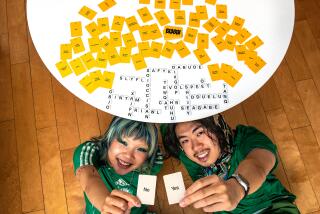Game Conquered the U.S. One Tile at a Time
- Share via
The board game we know as Scrabble was invented by Alfred Butts, an unemployed architect, in 1933 when the difficulties of the Depression began to seem unending. Butts thought that people needed a distraction during hard times. He’d researched other games and wanted to create one that mixed strategy, skill and luck. Growing up, Butts had played the word game Anagrams, in which players drew letters one by one from a jumble and attempted to make words.
If the available letters appeared in proportion to their use in language, Butts decided, and if players could draw a handful of letters at a time instead of singly, the making of words could be accomplished more easily. The game he invented was initially named Lexiko (from the Greek lexikos , meaning “of words”) and played without a game board.
Butts approached Milton Bradley, Parker Bros. and the publisher Simon & Schuster to solicit interest in his game and was universally rejected. Later, he changed the name to Criss Cross Words and added a playing board.
“Just as war begat chess,” writes Stefan Fatsis in his new book, “Word Freak,” “the advancing state of communications in America all but mandated the creation of a language-based strategy game. Butts invented a game that filled a void in the hierarchy of games, and in the culture.”
Still unable to sell the game to a major toy or game manufacturer, Butts entered into a manufacturing agreement in 1947 with James Brunot, an entrepreneur eager to get a piece of the action who coined the name Scrabble. In 1953, when the demand for the game became too much for Brunot to fill, Selchow & Righter, the sales representative for Milton Bradley, was licensed to manufacture it. By 1954, Scrabble had become the nation’s leading board game, with sales of nearly 3.8 million copies that year. Sales dropped to 2.3 million the following year and then to just over a million in 1956, with annual sales ranging between 1.1 million and 1.6 million every year through 1970. Hasbro acquired the rights to Scrabble in North America in 1988. Mattel acquired the international rights in 1993.
In those early days, several companies released word games hoping to mimic Scrabble’s popularity but to little success. Interestingly, Hasbro now has the most popular Scrabble-derivative games on the market with Upwords, a kind of Scrabble played in 3-D, and Boggle.
Today, Scrabble is still one of the bestselling and enduring games in the two-century history of the American toy industry. According to “Word Freak,” sales exceeded 2 million in 1998 and 1999, with about 100 million sets sold worldwide since the game was first mass-produced in 1948. The game’s appeal crosses all demographics. “It’s one of the most broadly played games on the market, from kids to seniors,” Fatsis says.
Editions of Scrabble are produced in 22 languages, from Arabic and Afrikaans to Hebrew and Russian and sold in 130 countries. The game sells here for about $12, with a deluxe edition priced at about $30.
Competitive Scrabble is serious stuff. The governing body of the game and its competitive play in North America, the National Scrabble Assn., is independent of Hasbro, though Hasbro provides the organization’s predominant funding. The association produces a newsletter for some 10,000 subscribers, tracks the ratings of 2,300 active tournament players, oversees 150 tournaments a year and sanctions 200 clubs.
Competitive players earn ratings based on their tournament scores, a system modeled on one used to rank chess players. A rating of 1,200 is considered a high-end novice; intermediate 1,200-1,600; expert rankings can top out at more than 2,000.
The game has become part of our cultural identity. Scrabble has been highlighted in a slew of feature films (“Foul Play,” “Rosemary’s Baby,” “Cookie’s Fortune” as well as the ‘70s comedy “Freebie and the Bean”); on television programs (“The Simpsons,” “Seinfeld” and Rosie O’Donnell’s show); in magazines (Mad regularly poked fun at the game); on the radio (Garrison Keillor lists the International Scrabble Hall of Fame in his piece about mythical Florida tourist traps) and in literature (Vladimir Nabokov describes an old Russian game that is said to be a precursor of Scrabble in his novel “Ada or Ardor”).
“The game is a cultural Zelig, a mockable emblem of Eisenhower-era family values, a stand-in for geekiness, a pastime so decidedly unhip that it’s hip,” Fatsis writes.
He adds: “It also embodies the narcotic allure of strategic games and the beauty of the English language.”
